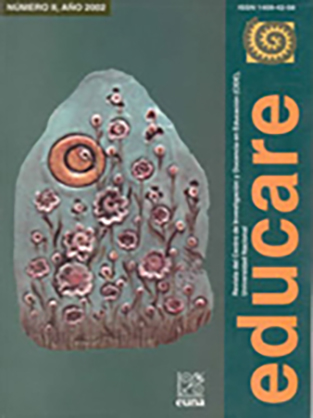Educación y Desarrollo
DOI:
https://doi.org/10.15359/ree.2002-2.6Abstract
This article deals with the relationship between the governing class and education as ideological machinery at the State service. It also addresses the issue of education as an economic, political and social development factor.
Education turns into an instrument at the service of democracy to form a tamed people whom the political class in government has tried, by means of imported models, to adjust them to the diverse socio-historical realities of our country.
References
Monge, A. C. y Rivas, R. F. (1980) La educación: Fragua de una
Democracia. San José: Editorial Costa Rica.
Murillo, R. C. (1995). Ensayos sobre desarrollo. Heredia: EFUNA.
Pérez, P. H. ( 1987). Ensayos sobre Educación. San José: Ediciones Guayacán.
Quesada C. J .R. ( 1987). La reforma de Mauro F ernández y Carlos Monge en Perspectiva histórica. Avances de Investigación Nº 29 CIH. UCR, San José.
Rama. G.W. (1994). A la búsqueda del siglo XXI: Nuevos caminos de
desarrollo en Costa Rica. San José: Editorial Universidad de Costa Rica.
Sobrado, Ch. J.J. (16 nov. 1995). "BID evalúa educación". San José. En
La Nación. Pág.17 A.
Undini, A.G. (2001). Sujeto juvenil latinoamericano. Construcción de
Identidades y diferencias en el capitalismo multinacional. Heredia: Material Inédito.
Víquez U. J. y otros. (1986) La investigación sobre los planes de estudio vigentes en la educación costarricense. San José: CEMIE-PROCAMIE.
Published
How to Cite
Issue
Section
License
1. In case the submitted paper is accepted for publication, the author(s) FREELY, COSTLESS, EXCLUSIVELY AND FOR AN INDEFINITE TERM transfer copyrights and patrimonial rights to Universidad Nacional (UNA, Costa Rica). For more details check the Originality Statement and Copyright Transfer Agreement
2. REUTILIZATION RIGHTS: UNA authorizes authors to use, for any purpose (among them selfarchiving or autoarchiving) and to publish in the Internet in any electronic site, the paper´'s final version, both approved and published (post print), as long as it is done with a non commercial purpose, does not generate derivates without previous consentment and recognizes both publisher's name and authorship.
3. The submission and possible publication of the paper in the Educare Electronic Journal is ruled by the Journal’s editorial policies, the institutional rules of Universidad Nacional and the laws of the Republic of Costa Rica. Additionally, any possible difference of opinion or future dispute shall be settled in accordance with the mechanisms of Alternative Dispute Resolution and the Costa Rican Jurisdiction.
4. In all cases, it is understood that the opinions issued are those of the authors and do not necessarily reflect the position and opinion of Educare, CIDE or Universidad Nacional, Costa Rica. It is also understood that, in the exercise of academic freedom, the authors have carried out a rogorous scientific-academic process of research, reflection and argumentation thar lays within the thematic scope of interest of the Journal.
5. The papers published by Educare Electronic Journal use a Creative Commons License:














 The articles published by Educare Electronic Journal can be shared with a Creative Commons License:
The articles published by Educare Electronic Journal can be shared with a Creative Commons License: 



